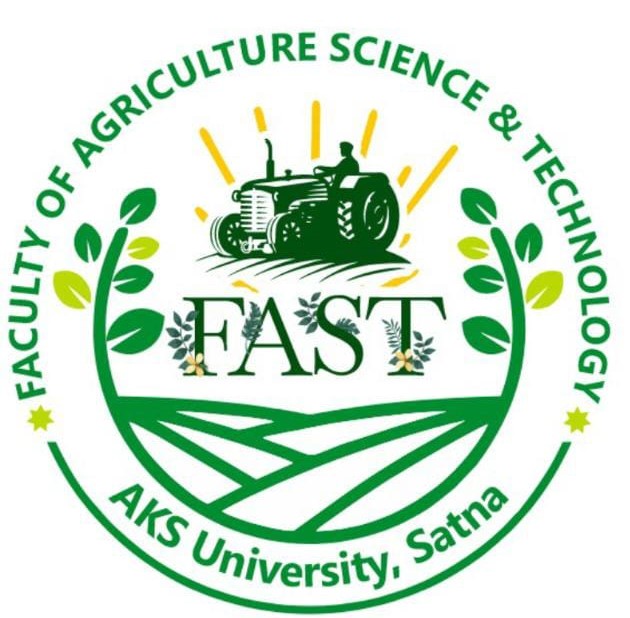Department of Soil Science
About the Department
Vision
Mission
HOD's Desk
Graduate Attributes (GA)
About the Department
Overview of the Department
The Department of Soil Science plays a vital role in advancing agricultural sustainability and environmental sustainability. As a core branch of agricultural sciences, it is dedicated to understanding the physical, chemical, and biological properties of soil and their interactions with plants, water, and climate. At institutions like AKS University, the department focuses on teaching, research, and extension activities that address current challenges in agriculture and land management.
Academically, the department offers undergraduate, postgraduate (M.Sc. in Soil Science), and Ph.D. programs, equipping students with both theoretical knowledge and practical skills in soil analysis, nutrient management, and sustainable farming practices. The curriculum is designed to integrate modern tools like Remote Sensing, GIS, and precision agriculture technologies, providing students with a holistic view of soil resource management.
Research in the department centers on soil fertility and nutrient management, organic farming, soil microbiology, carbon sequestration, soil and water conservation, and pollution remediation. The department is actively involved in projects that improve soil health using bio-fertilizers, composting methods, and eco-friendly soil amendments. It also conducts field demonstrations, workshops, and training programs to transfer scientific knowledge to farmers and agricultural professionals. The department is well-equipped with laboratories for soil and water testing, microbial studies, and GIS mapping. Through collaborations with research institutions, government agencies, and the private sector, the Department of Soil Science contributes to national goals of food security, climate resilience, and sustainable resource use. It nurtures future soil scientists, researchers, and agronomists for impactful careers in agriculture and environmental management.
Our department takes pleasure in promoting projects like organic farming, natural farming, and awareness campaigns on sustainable practices, organic farming with production of various compost, and environmental conservation beyond the classroom. Our committed faculty members never stop working to deliver high-quality instruction and make sure that farmers and students are aware of the most recent developments in agriculture.
Academically, the department offers undergraduate, postgraduate (M.Sc. in Soil Science), and Ph.D. programs, equipping students with both theoretical knowledge and practical skills in soil analysis, nutrient management, and sustainable farming practices. The curriculum is designed to integrate modern tools like Remote Sensing, GIS, and precision agriculture technologies, providing students with a holistic view of soil resource management.
Research in the department centers on soil fertility and nutrient management, organic farming, soil microbiology, carbon sequestration, soil and water conservation, and pollution remediation. The department is actively involved in projects that improve soil health using bio-fertilizers, composting methods, and eco-friendly soil amendments. It also conducts field demonstrations, workshops, and training programs to transfer scientific knowledge to farmers and agricultural professionals. The department is well-equipped with laboratories for soil and water testing, microbial studies, and GIS mapping. Through collaborations with research institutions, government agencies, and the private sector, the Department of Soil Science contributes to national goals of food security, climate resilience, and sustainable resource use. It nurtures future soil scientists, researchers, and agronomists for impactful careers in agriculture and environmental management.
Our department takes pleasure in promoting projects like organic farming, natural farming, and awareness campaigns on sustainable practices, organic farming with production of various compost, and environmental conservation beyond the classroom. Our committed faculty members never stop working to deliver high-quality instruction and make sure that farmers and students are aware of the most recent developments in agriculture.
Key Achievements
Here, are few key achievements of the Department of Soil Science at AKS University:
1. Development of Eco-Friendly Nutrient Management Techniques : Successfully implemented integrated nutrient management practices using organic and bio-fertilizers, improving soil fertility and crop productivity while reducing chemical input dependence.
2. Advancement in Soil Health Monitoring : Established modern soil testing laboratories and introduced rapid soil analysis methods, contributing to improved soil health card distribution and precise nutrient recommendations for farmers.
3. Research on Carbon Sequestration and Climate Resilience : Conducted impactful research on soil carbon storage and sustainable land use practices, supporting efforts in climate change mitigation and adaptation.
4. Promotion of Precision Agriculture Technologies : Integrated GIS and remote sensing tools in soil mapping and land suitability assessments, enhancing data-driven decision-making in agriculture and resource management.
5. We emphasizes on sharing chances and technologies for sustainable and effective agricultural production in order to raise the crop yield.
6. Research paper publication, book and article production, faculty recognition, national exam performance, and government and private sector placement.
1. Development of Eco-Friendly Nutrient Management Techniques : Successfully implemented integrated nutrient management practices using organic and bio-fertilizers, improving soil fertility and crop productivity while reducing chemical input dependence.
2. Advancement in Soil Health Monitoring : Established modern soil testing laboratories and introduced rapid soil analysis methods, contributing to improved soil health card distribution and precise nutrient recommendations for farmers.
3. Research on Carbon Sequestration and Climate Resilience : Conducted impactful research on soil carbon storage and sustainable land use practices, supporting efforts in climate change mitigation and adaptation.
4. Promotion of Precision Agriculture Technologies : Integrated GIS and remote sensing tools in soil mapping and land suitability assessments, enhancing data-driven decision-making in agriculture and resource management.
5. We emphasizes on sharing chances and technologies for sustainable and effective agricultural production in order to raise the crop yield.
6. Research paper publication, book and article production, faculty recognition, national exam performance, and government and private sector placement.
Vision
Vision
The vision of a Department of Soil Science is to focuses on fostering innovative solutions and management of soil resources to support sustainable agricultural practices, environmental conservation, improving soil health, enhancing agricultural productivity, land use planning and contributing to global environmental sustainability.

Mission
Mission
The missions of a Department of Soil Science typically align with its vision, focusing on advancing knowledge, fostering innovation, and addressing societal needs related to soil management and conservation. Here are some common missions that such a department might have:
1. Conducting Cutting-Edge Research
1. Conducting Cutting-Edge Research
- To advance scientific understanding of soil properties, soil health, and soil management practices.
- To explore the interactions between soil and the environment, including water, air, and plant systems, to develop sustainable land-use practices.
- To develop and promote soil conservation techniques that support sustainable agricultural practices.
- To address issues like soil erosion, nutrient depletion, and soil pollution, and provide solutions for improving soil quality.
- To develop innovative soil management strategies that increase crop yields while maintaining soil health.
- To investigate soil fertility management, including nutrient cycling, organic matter content, and the use of soil amendments.
- To provide high-quality education and training for students at undergraduate, graduate, and professional levels.
- To prepare future soil scientists and land managers with the knowledge and skills needed to address global challenges related to soils.
- To engage with farmers, landowners, and policymakers, offering extension services and advice on soil management and conservation.
- To collaborate with local, national, and international organizations in soil-related initiatives and advocacy.
- To contribute to the understanding of soil’s role in climate change mitigation, carbon sequestration, and biodiversity conservation.
- To promote research and practices that restore degraded soils and prevent further land degradation.
- To collaborate with national and international research organizations, universities, and governments to address global soil-related issues.
- To participate in and contribute to global efforts aimed at improving food security, soil conservation, and sustainable land use.
HOD's Desk
Dr. Sugyata Shivhare
M.Sc.(Ag) Soil Science, Ph.D. in Soil Science and Agricultural Chemistry, OUAT, Bhubaneswar, Odisha
Head of the DepartmentDepartment of Soil ScienceAKS University, Satna (M.P.) India – 485001

Message
The Department of Soil Science, established in 2012 under the Faculty of Agricultural Science & Technology (FAST) at AKS University, Satna (M.P.), is the oldest department of the university.
The M.Sc. (Ag.) program in Soil Science was introduced in 2015 under the leadership of Professor (Dr.) S.S. Tomar, Dean, FAST. The department further progressed under the guidance of Senior Professor (Dr.) Nand Ram, Professor (Dr.) T. Singh, and Professor (Dr.) Neeraj Verma, Director of Research. In 2024, the Ph.D. program in Soil Science was launched under the headship of Dr. Sugyata Shivhare, Head of the Department Soil science. The department also offers soil science courses to undergraduate students enrolled in B.Sc.(Hons.) Agriculture and B.Tech. (Hons.) Agricultural Engineering programs. Equipped with modern laboratories and active research initiatives, the department has built strong academic and industry collaborations.
Its alumni serve in respected teaching and research positions, contributing to sustainable land management and addressing global soil health and productivity challenges.
The M.Sc. (Ag.) program in Soil Science was introduced in 2015 under the leadership of Professor (Dr.) S.S. Tomar, Dean, FAST. The department further progressed under the guidance of Senior Professor (Dr.) Nand Ram, Professor (Dr.) T. Singh, and Professor (Dr.) Neeraj Verma, Director of Research. In 2024, the Ph.D. program in Soil Science was launched under the headship of Dr. Sugyata Shivhare, Head of the Department Soil science. The department also offers soil science courses to undergraduate students enrolled in B.Sc.(Hons.) Agriculture and B.Tech. (Hons.) Agricultural Engineering programs. Equipped with modern laboratories and active research initiatives, the department has built strong academic and industry collaborations.
Its alumni serve in respected teaching and research positions, contributing to sustainable land management and addressing global soil health and productivity challenges.
Graduate Attributes (GA)

